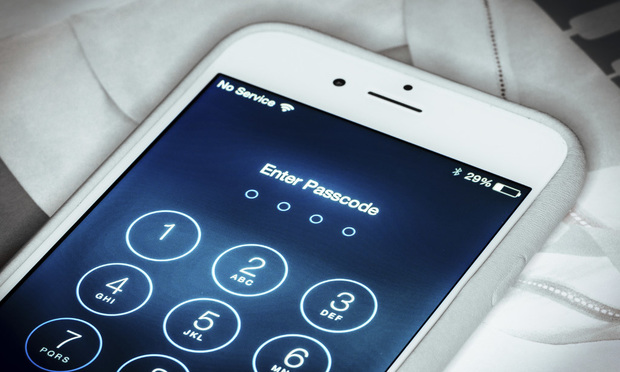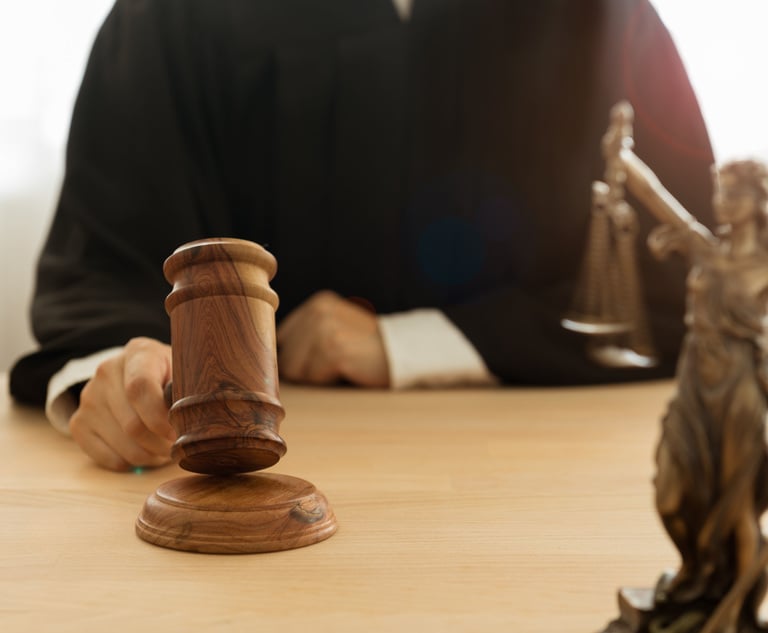Must a Criminal Defendant Turn Over Cellphone Passwords? NJ Supreme Court Will Decide
In an increasingly technological age, the case is one lawyers are paying close attention to with the Association of Criminal Defense Lawyers of New Jersey listed as an amicus.
May 09, 2019 at 11:19 AM
8 minute read
 (Photo: iStock)
(Photo: iStock)
Does compelling a criminal defendant to turn over an iPhone passcode violate his or her Fifth Amendment right against self-incrimination?
That's a question the New Jersey Supreme Court has agreed to take up. It granted a petition for certification in State v. Andrews on May 6.
In an increasingly technological age, the case is one lawyers are paying close attention to with the Association of Criminal Defense Lawyers of New Jersey listed as an amicus.
In State v. Andrews, defendant Andrews, an Essex County sheriff's officer, was identified as assisting a suspected drug trafficker during a police investigation of the trafficker's activities. Andrews was required by a trial court judge to disclose the personal identification numbers (PIN) and passwords (passcodes) for his lawfully seized iPhones that he allegedly used to assist the drug-trafficker.
Andrews argued that compelling him to disclose such information violated his right against self-incrimination under the Fifth Amendment to the U.S. Constitution, and the protections against self-incrimination afforded under New Jersey law.
On Nov. 15, 2018, the Appellate Division affirmed the ruling in favor of the state. The panel said compelling Andrews to turn over passcodes to his iPhones was not self-incrimination, and such action was not a violation of state law, and that he wasn't being asked to provide information that police didn't already have on him.
“We therefore conclude that the trial court correctly found that compelled disclosure of defendant's passcodes does not violate defendant's Fifth Amendment privilege against self-incrimination,” said the panel, consisting of Appellate Division Judges Joseph L. Yannotti, Garry S. Rothstadt and Arnold L. Natali Jr.
 Judge Joseph Yannotti (Photo: Carmen Natale/ALM)
Judge Joseph Yannotti (Photo: Carmen Natale/ALM)“Applying the privilege against self-incrimination to cell phone passcodes would essentially preclude the State from obtaining the contents of any passcode-restricted device as part of a criminal investigation,” Yannotti wrote for the panel.
Andrews was part of an investigation in mid-2015 by a task force of the Essex County Prosecutor's Office into a suspected narcotics-trafficking network out of Newark.
During the investigation, a man suspected as a drug trafficker identified Andrews as an officer in the Essex County Sheriff's Office who had helped him conceal his illegal activities. The man taken into police custody, identified as Quincy Lowery, said Andrews registered a Jeep and motorcycle that he was driving under Andrews' name because Lowery's license was suspended, according to the Appellate Division.
Lowery also allegedly showed police a picture of a license plate he had texted to Andrews. Investigators later confirmed the license plate belonged to a vehicle the task force had used in a surveillance operation, and the phone number that Lowery sent the text to belonged to one of Andrews's iPhones, it was alleged.
It was later revealed that Lowery's phone and call records showed a series of text messages with Andrews, authorities said.
On the night Lowery was arrested, the Internal Affairs Department of the ECPO confronted Andrews and asked him to turn over his two iPhones. Andrews complied and turned the iPhones in, but he refused to consent to a search of either phone or give a statement, according to the Appellate Division.
Andrews later requested that the iPhones be returned to him. The internal affairs officers denied the request and held the phones pending an application of a search warrant.
In June 2016, an Essex County grand jury returned a six-count indictment against Andrews, charging him with second-degree official misconduct, third-degree hindering the apprehension or prosecution of another person, and fourth-degree obstruction of the administration of the law or government function.
In January 2017, the state filed a motion to compel Andrews to disclose the passcodes required to unlock his iPhones, arguing that because the devices were locked, authorities had no way to ascertain whether they contained any of the missing texts between Lowery and him, or any information about their calls since Lowery had reset his own phone 30 days prior to his arrest, thus erasing all texts and call number data during that period.
The state asserted that the only way to obtain records of the texts and calls was through Andrews' iPhones since, according to investigators, “Apple is a closed end to end system,” and Andrews' service providers do not have access to Apple's system.
The Essex County Law Division on May 22, 2017, filed a written opinion concluding that the state's motion should be granted. The court found that Andrews' constitutional right against self-incrimination and privilege against self-incrimination under New Jersey's common law were not violated by compelling him to reveal passcodes to his iPhones.
However, while the order by the trial court required Andrews to disclose the passcodes, it limited the state's access “to that which is contained within the 'Phone' icon(s) and application on his two iPhones and the 'Messages' icon(s) and/or text messaging applications.”
The order also required Andrews to disclose the passcodes in camera before any disclosure to the state, and directed the state to perform the actual search “in camera, in the presence of defense counsel in the court.”
In June 2017, Andrews filed a motion seeking leave to appeal the trial court's order. A month later, the Appellate Division denied the motion.
Andrews then filed a motion in the Supreme Court for leave to appeal. The Supreme Court granted the motion and summarily remanded the appeal to the Appellate Division for consideration of its merits. The appellate panel permitted the Association of Criminal Defense Lawyers of New Jersey (ACDL-NJ) to appear as amicus curiae.
Andrews is currently under indictment and suspended as an Essex County Sheriff's officer, according to his attorney, Charles J. Sciarra of Sciarra & Catrambone in Clifton.
On Wednesday, Sciarra said the case implicates civil rights, and he was pleased the state Supreme Court will take it up.
“This is 2019, and as much as cellphones are a part of our daily lives, this is a critical civil rights issue,” Sciarra said. “I frankly believe the Appellate Division decision was unrecognizable from the law and facts that we presented, and we are extremely grateful the Supreme Court will take a full and complete review.
“The idea that a defendant can be compelled to provide evidence against himself is offensive to anybody who recognizes the importance of the Bill of Rights,” Sciarra added. “I grew up watching TV where criminal suspects were told they have the right to remain silent. That is a cultural and legal principle which will be tested in this case, which we hope the Supreme Court will endorse and confirm.”
Tiffany Russo, a special deputy attorney general making the case for the Essex County Prosecutor's Office and who filed the petition for leave to appeal on behalf of the state, couldn't be reached for comment.
Lawyers from Fox Rothschild are to argue on behalf of the ACDL-NJ before the high court, and petitioned the court to take up the case, according to a release, which noted that the issue of compelling disclosure of cellphone passwords has not been approached by many courts.
“The term 'compel,' when used to refer to a criminal defendant, raises issues of the highest constitutional magnitude,” Matthew S. Adams, a partner in the firm's Morristown office and co-chair of the white collar criminal defense and regulatory compliance group, said in a statement. “The New Jersey Supreme Court has a proud tradition of protecting individual rights, and this case could set an important precedent that will guide courts throughout the country.”
Marissa Koblitz Kingman, Jordan Kaplan and Victoria Salami from Fox also worked on the brief, according to the release.
John A. Azzarello, president of the ACDL-NJ, said the association has grave concerns about the Appellate Division's decision in State v. Andrews.
“We believe compelling an individual to turn over his or her cellular telephone password pursuant to a subpoena is testimonial in nature and a clear violation of one's Fifth Amendment rights,” Azzarello said in an email on Thursday. “Moreover, as United States Supreme Court Chief Justice Roberts noted in the Carpenter opinion, today's cell phones are much like human appendages and contain a wealth of personal and private information.
Affirming the Appellate Division, he said, “would be … the functional equivalent of handing the key to law enforcement to rummage through the entire contents of an individual's cell phone without the specificity requirements of a valid search warrant.”
This content has been archived. It is available through our partners, LexisNexis® and Bloomberg Law.
To view this content, please continue to their sites.
Not a Lexis Subscriber?
Subscribe Now
Not a Bloomberg Law Subscriber?
Subscribe Now
NOT FOR REPRINT
© 2025 ALM Global, LLC, All Rights Reserved. Request academic re-use from www.copyright.com. All other uses, submit a request to [email protected]. For more information visit Asset & Logo Licensing.
You Might Like
View All

Judge Jablonski and Chief Justice Rabner Both Acted Completely Properly
4 minute read
In 2-1 Ruling, Court Clears Way for Decade-Old Wrongful Imprisonment Suit
5 minute read
Trending Stories
- 1'It's Not Going to Be Pretty': PayPal, Capital One Face Novel Class Actions Over 'Poaching' Commissions Owed Influencers
- 211th Circuit Rejects Trump's Emergency Request as DOJ Prepares to Release Special Counsel's Final Report
- 3Supreme Court Takes Up Challenge to ACA Task Force
- 4'Tragedy of Unspeakable Proportions:' Could Edison, DWP, Face Lawsuits Over LA Wildfires?
- 5Meta Pulls Plug on DEI Programs
Who Got The Work
Michael G. Bongiorno, Andrew Scott Dulberg and Elizabeth E. Driscoll from Wilmer Cutler Pickering Hale and Dorr have stepped in to represent Symbotic Inc., an A.I.-enabled technology platform that focuses on increasing supply chain efficiency, and other defendants in a pending shareholder derivative lawsuit. The case, filed Oct. 2 in Massachusetts District Court by the Brown Law Firm on behalf of Stephen Austen, accuses certain officers and directors of misleading investors in regard to Symbotic's potential for margin growth by failing to disclose that the company was not equipped to timely deploy its systems or manage expenses through project delays. The case, assigned to U.S. District Judge Nathaniel M. Gorton, is 1:24-cv-12522, Austen v. Cohen et al.
Who Got The Work
Edmund Polubinski and Marie Killmond of Davis Polk & Wardwell have entered appearances for data platform software development company MongoDB and other defendants in a pending shareholder derivative lawsuit. The action, filed Oct. 7 in New York Southern District Court by the Brown Law Firm, accuses the company's directors and/or officers of falsely expressing confidence in the company’s restructuring of its sales incentive plan and downplaying the severity of decreases in its upfront commitments. The case is 1:24-cv-07594, Roy v. Ittycheria et al.
Who Got The Work
Amy O. Bruchs and Kurt F. Ellison of Michael Best & Friedrich have entered appearances for Epic Systems Corp. in a pending employment discrimination lawsuit. The suit was filed Sept. 7 in Wisconsin Western District Court by Levine Eisberner LLC and Siri & Glimstad on behalf of a project manager who claims that he was wrongfully terminated after applying for a religious exemption to the defendant's COVID-19 vaccine mandate. The case, assigned to U.S. Magistrate Judge Anita Marie Boor, is 3:24-cv-00630, Secker, Nathan v. Epic Systems Corporation.
Who Got The Work
David X. Sullivan, Thomas J. Finn and Gregory A. Hall from McCarter & English have entered appearances for Sunrun Installation Services in a pending civil rights lawsuit. The complaint was filed Sept. 4 in Connecticut District Court by attorney Robert M. Berke on behalf of former employee George Edward Steins, who was arrested and charged with employing an unregistered home improvement salesperson. The complaint alleges that had Sunrun informed the Connecticut Department of Consumer Protection that the plaintiff's employment had ended in 2017 and that he no longer held Sunrun's home improvement contractor license, he would not have been hit with charges, which were dismissed in May 2024. The case, assigned to U.S. District Judge Jeffrey A. Meyer, is 3:24-cv-01423, Steins v. Sunrun, Inc. et al.
Who Got The Work
Greenberg Traurig shareholder Joshua L. Raskin has entered an appearance for boohoo.com UK Ltd. in a pending patent infringement lawsuit. The suit, filed Sept. 3 in Texas Eastern District Court by Rozier Hardt McDonough on behalf of Alto Dynamics, asserts five patents related to an online shopping platform. The case, assigned to U.S. District Judge Rodney Gilstrap, is 2:24-cv-00719, Alto Dynamics, LLC v. boohoo.com UK Limited.
Featured Firms
Law Offices of Gary Martin Hays & Associates, P.C.
(470) 294-1674
Law Offices of Mark E. Salomone
(857) 444-6468
Smith & Hassler
(713) 739-1250






